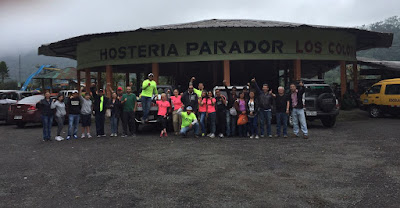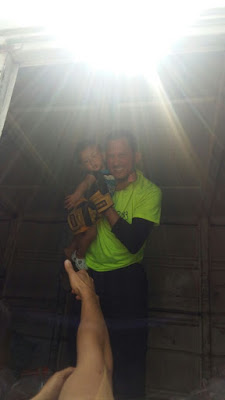The evening of April 16th an earthquake rippled through the ocean and hit the coast of Ecuador with a force of 7.8 on the Richter Scale. You likely already know this because it made international news, with the death toll rising to 661 and another 27,732 injured, images of coastal cities that were leveled by the earth's jarring movements made front page news. I was visiting Medellin when the quake cracked the earth here, so we experienced the tragedy in largely the same way, through the media, through Facebook and Twitter. For having lived here for nearly three years, I felt strangely removed from the devastation that night. But upon returning home from the weekend trip to Columbia, the dust settled in the cities, only to reveal the reality of the disaster, and the truth that it will likely take years for these towns to rebuild.
While the reality was heavy, I was heartened and impressed with the ways individuals and schools and organizations like the Red Cross rallied, and aid flooded in from other countries.
After some days, the gravity of the devastation did become more than photos and news articles, and it felt like I needed to do ... something.
Enter Fernando Aguirre and his foundation Radicales. My good friend Nicole and her husband Andres pointed me in his direction as they volunteer with Radicales. As fortune would have it, Fercho was planning a trip to the coast on a weekend that I had Friday free.
At 4:30 am on May 27th I gathered with Mara, a friend at Americano, Fernando, and 14 other Quiteños to begin the drive to the coast. While I am sleeping little in my own bed as of late, that bus rocked me right to sleep and I proved to have a good bout of narcolepsy each time we hopped back on it after making a stop in a little town. It did feel like an auspicious beginning to the weekend, being able to sleep.
 |
| Voluntarios de Radicales |
 |
| Fernando and our hosts. Not only did we have beds and showers at Rodavi, the Rodríquez family also fed us a delicious breakfast of plantain empanadas, shrimp and eggs. |
After listening to her recount her experience, we boarded the bus and drove 90 minutes to Canoa, until recently, one of the most popular beaches frequented by teachers. Prior to the earthquake, Canoa was the town we went to sleep on the beach, to try out our sea legs on a surfboard, to eat fresh ceviche, sip piña coladas and bump and grind to the music that blared out of competing stereos of neighbouring beach bars after the sun had set. This Canoa has been devastated. Canoa today is a tent town, as these are now the dwellings of so many of the townspeople. While dozens of dogs still find reason to romp and play, and the young children run barefoot, laughing as they chase one another outside of the tents, the parents, grandparents, aunts and uncles show troubled expressions, lines of sorrow, and stress and fatigue crease their brows and betray little in their eyes.
Upon arrival in Canoa, we parked our caravan and Fernando organized the distribution of goods that we had brought to deliver. He had a list of families, and as he called a representation from each family, a volunteer from Radicales would go to the family member and walk them to the truck with the supplies, things like canned food, toiletries, diapers and blankets. In this short walk, we asked those whose hands we held ¿Cómo le va? How is it going with you?
It was while engaging in these brief conversations, and hearing those of my new friends, that it struck me once again that so much power exists in few words. The responses we got were varied. Our family is okay; nothing else matters ... I can feel the love, and I can feel the prayers from all of you ... The earth shook, the house fell and just like that my father, cousin and friend were gone ... I am living with my sister now, me and her and all of our children. We are taking care of one another ... And sometimes our inquiry was simply met with tears, the ones that flow when you've been shouldering a large burden and a loved one asks you how you are doing, and the dam breaks. And so we hugged one another, and shared in sorrow, continued holding hands with strangers and it didn't feel so strange. We felt connected. We felt a familiar and comforting energy flow between us. And I heard my Radical friends offer so much back in few words. Words of comfort and strength and solidarity. I felt so blessed to have met up with this group, to be reminded of what deeply generous and kind spirits are all around me.
 |
| Fernando extending his kindness and love. |
 |
| Andrea and her words of strength. |
 |
| Sebas has this wonderful embrace. |
 |
| Vanessa is a child whisperer. |
 |
| Most of her time with the children was very animated, singing songs and dancing. |
 |
| Sonrisas from the niños. |
A few days after our return to Quito, Fernando received the following message from the community leader in Canoa, words that brought goosebumps to rise on my skin:
Saludos Sr. Fernando,
En nombre de mi pueblo y de parte mia estamos muy agredecido...mi gente de Canoa quedo muy contenta...ya que las ayudas no llegaban como al principio...despues de casi mes y medio del terremoto ustedes llegaron en el momento preciso...GRACIAS MUCHAS GRACIAS...DIOS SE LOS MULTIPLIQUE.
Translation:
Greetings Mr. Fernando,
On behalf of my town and myself I would like to say that we are so appreciative...my people in Canoa are happy now, because much help did not arrive in the beginning...one month and a half after the earthquake you all arrived in the most precise moment. THANK YOU...SO MANY THANKS...MAY GOD MULTIPLY YOU.
After spending a night at Rodavi, and chowing down the delicious breakfast cooked with much love from the Rodríquez family, we set back out on the road to visit several more communities near Tosagua and Bahía. As we followed the same protocol as the day before, we were again met with deep gratitude and appreciation from those we came to serve.
 |
| Javi lovin' up another one of the littles. |
 |
| Mara and her smiles. |
 |
| ¡Fuerza Manabí! |
Because of her patchwork Andes, snowcapped volcanoes, lush jungles, warm Pacific waters that kiss her shores and wildlife on the Galapagos Islands, a popular hashtag has been #allyouneedisecuador. And now, today, all Ecuador needs is you.
If in the coming months you are able to volunteer here in Quito, or make a trip to the coast, I encourage you to contact Fernando. His email is fernandoaguirre
This week, as it is my last week with my seniors, I was reading them Omid Safi's "The Problematic Idea of Success." He closes this speech to university graduates with the following words: If you care about justice and social justice, and by God you should, because this planet is burning up and the people are crying out! At home, and globally, we need you. We need you not to be successful; we need you to be great. Greatness as measured by the extent to which you are willing to put your love into the service of others.
Extending love to the coast. Sending abrazos from Quito. XOXOXO
A beautiful description of a very meaningful weekend. Your words honor what we saw and felt. And I teared up at what you said about me... abrazos abrazos,
ReplyDeleteMara
And I had tears too at what you all did. Thanks to you and your friends, Jamie.
ReplyDelete